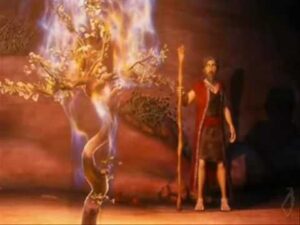The Lord Jesus says, “Moses wrote of Me” (John 5:46). Let us join Cyril and Luther … in regarding this [burning bush] as Mary’s Son, the Lord Jesus, our Advocate. …
Here there is both fire and a green thornbush (this meaning being suggested by the Hebrew word). In Christ there is both God and Man. “God is a consuming fire,” says Moses (Deut. 4:24). Indeed, so He is toward all wicked, ungodly people. The damned will surely find this out in hell. Yet we also see in this account that God is a gracious flame of comfort to all godly hearts, whom He desires not to destroy but only to fill with pleasant warmth and comfort. God is a fiery, eternal Light able to hear, see, speak, think, advise, and rescue. This is all shown here. In the green bush, the pure, tender, and most sacred manhood of Christ is indicated. For the Lord Jesus calls Himself the green tree (Luke 23:31), and Isaiah calls Him “a green branch out of the dry root of Jesse” (Isa. 11:1). Therefore, just as fire and green wood are found together here, so “God and Man are one Christ” … Here Moses had to take off his sandals and cover his face. Likewise, all men must take captive and blindfold their reason, planting their feet and grounding themselves only on God’s revealed truth. Whoever does this may boldly come before God and pray in Jesus’ name. Without the true knowledge of Christ, our petitions to God would be all in vain. Thus, as the fire did not consume the green bush, so the Son of God did not swallow up the human nature, but took it into Himself. “The nature which the Logos once assumed He will never relinquish,” says St. John of Damascus. This is our peculiar honor above all other creatures. Jesus remains true God and true Man without any mixture or confusion of natures in His undivided person, all for our comfort, benefit, and eternal glory.
Here Moses had to take off his sandals and cover his face. Likewise, all men must take captive and blindfold their reason, planting their feet and grounding themselves only on God’s revealed truth. Whoever does this may boldly come before God and pray in Jesus’ name. Without the true knowledge of Christ, our petitions to God would be all in vain. Thus, as the fire did not consume the green bush, so the Son of God did not swallow up the human nature, but took it into Himself. “The nature which the Logos once assumed He will never relinquish,” says St. John of Damascus. This is our peculiar honor above all other creatures. Jesus remains true God and true Man without any mixture or confusion of natures in His undivided person, all for our comfort, benefit, and eternal glory.
As fire here descended upon a thornbush, so the Lord Jesus humbled Himself, took on our flesh and blood, and in deep humility at last bowed down beneath the crown of thorns (Matt. 27:29). Likewise, you see here the eternal Light in the thornbush crowned with twisted thorns so that the thorns of God’s curse might be taken away from thorny Sinai, and God’s blessing conferred on us, and we have peace with God (Rom. 5:1).
The bush burned and yet was not consumed. The Lord Jesus suffered, burning in the fire of His Father’s wrath. He “drank of the brook in the way,” yet “He lifted up His head” (Ps. 110:7). Through His suffering He entered into His glory (Luke 24:26) and is eternally green. Here you have both Passion Week and Easter Week. And as the green bush was not consumed, so the believing heart that takes pleasure in the incarnation of Jesus Christ shall not be destroyed by the fire of God’s wrath. Though by the contemplation of our Sins we fall into anguish, as if we were in the midst of flames, no tribulation shall consume us. Whoever clings to Christ will valiantly pass through all misery to that eternal heavenly light won for us by the Lord Jesus.
Valerius Herberger, The Great Works of God, Exodus, 42-44
